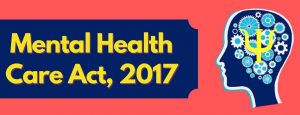Mental Healthcare Act, 2017:

The National Human Rights Commission (NHRC) gas raised concern over the Deplorable Condition of many Mental Healthcare Institutions (MHIs) in India, violating Mental Healthcare Act (MHA), 2017.
- According to the NHRC, MHIs are “illegally” keeping patients long after their recovery, which not only violates Article 21 but also highlights failure of the Governments to discharge the obligation under various international Covenants relating to rights of persons with disabilities which have been ratified by India.
- Before MHA 2017, the Mental Healthcare Act, 1987 existed, which prioritized the institutionalization of mentally ill people and did not afford any rights to the patient.
- The Act provided disproportionate authority to judicial officers and mental health establishments to authorize long-stay admissions, often against the informed consent and wishes of the individual.
- Consequently, several persons continue to be admitted and languish in mental health establishments against their will.
- It embodied the ethos of the colonial-era Indian Lunacy Act of 1912, which linked criminality and madness.
Asylums were places where “abnormal” and “unproductive” behaviour was studied as an individual phenomenon, isolating the individual from society. The intervention is meant to correct an inherent deficit or “abnormality”, thereby leading to “recovery”.
In 2017, the MHA dismantled the clinical heritage attached to asylums.
What is MHA 2017?
About:
This Act defined mental illness as “a substantial disorder of thinking, mood, perception, orientation, or memory that grossly impairs judgment, behaviour, capacity to recognize reality or ability to meet the ordinary demands of life, mental conditions associated with the abuse of alcohol and drugs.
It also provides the right of patients to access facilities that include rehabilitation services in the hospital, community, and home, sheltered and supported accommodation.
It regulates the research on PMI (Person with Mental Illness) and the use of neurosurgical treatments.




